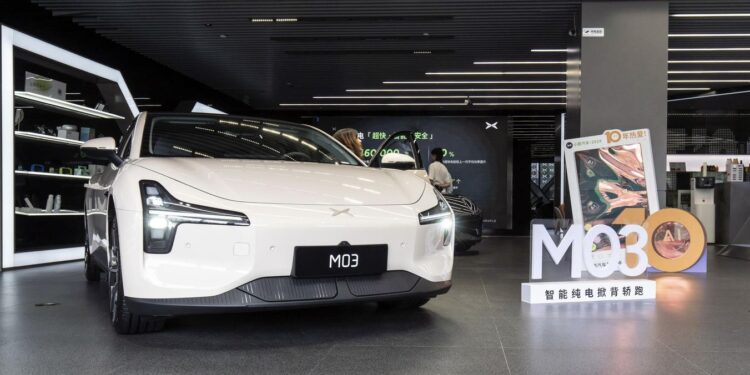China EV maker Xpeng, led by billionaire He Xiaopeng, launched a new Mona M03 model this month. … [+] Volkswagen bought a 5% stake and announced a partnership with the 10-year-old Guangzhou-headquartered business last year. Â Photographer: Qilai Shen/Bloomberg
© 2024 Bloomberg Finance LP
The new round of import tariffs on Chinese EVs in North America announced this week will make it difficult for suppliers from the Asian nation to enter the market, but could eventually give way to cross-border partnerships as legacy automakers that once dominated the industry look to better compete globally, an industry analyst predicted in an interview.
“Whether we actually see Chinese brands in the U.S. might be irrelevant,” said Tu Le, managing director of Detroit-based consultancy Sino Auto Insights. “Initially we’ll likely see Chinese IP (intellectual property) in cars that are sold in the U.S.,” said Le. “Larger (global) makers are already partnering with Chinese” to produce EVs, he noted.
Le spoke on the sidelines of the U.S.-China Business Forum held in New York on Tuesday. The event organized by Forbes China, the Chinese-language edition of Forbes, attracted about 100 businesspeople involved in U.S.-China business. Besides Le, other speakers at the hybrid event included Chinese Ambassador to the U.S. Xie Feng (see post here).
Just this week, Canada followed up on recently announced U.S. plans for new tariffs on Chinese EVs with 100% tariffs of its own. The decision was backed by U.S. Trade Representative Katherine Tai who criticized “state-directed, unfair, and anti-competitive non-market policies and practices, which threaten the existence of our market-oriented industries. Canada’s actions are an important step towards ensuring workers and businesses can compete fairly in the electric vehicle, steel, and aluminum industries.”
The Washington-Ottawa moves “are creating a united front for North America, making entry into North America for Chinese EV makers very unattractive,” and leaving EV prices far above global markets, Le said.
Underscoring how competition in China continues to press global prices lower, Chinese maker Xpeng this week launched a new EV — the Mona M03 – starting at $16,800. The low price for the fully featured model signals a squeeze for Telsa in the Chinese market, as well as other locals including local leader BYD. “If Tesla came out with a $25,000 model for the China market, it wouldn’t be (low) enough. It would be bringing a knife to a gunfight or analog toys to a digital party,” Le said.
“Xpeng is lowering the floor on a full-feature EV,” he said. That is a shot across the bow to BYD, which right now is one of the only profitable (EV) companies” in China, Le noted. This week, BYD said net profit rose by nearly a quarter the six months to June to 13.6 billion yuan, on sales that gained 16% to 301 billion yuan. “By and large, 90% of automakers are not making money currently in the China market.” Xpeng’s U.S.-traded shares gained 8% today on Thursday the announcement, but have lost more than half of their value in the past year.
Through offering short-term protection to North American makers, the U.S. and Canadian tariffs “actually do a disservice” to the big U.S. automakers, Le said. “If there’s not more competition in the U.S. market or North American market, it disincentivizes them from changing everything or evolving into a global player that can compete with the Chinese EV players. I don’t know currently how they thread that needle with the restrictions on Chinese technology and the high tariffs,” Le said.
Rather than going their own way against China, Le expects Western makers to seek more partnerships with Chinese manufacturers. Xpeng itself is about 5% owned by Volkswagen after the German maker formed a partnership with the Chinese private-sector firm last year. Another European maker, Stellantis, whose global brands include Fiat and Chrysler, paid $1.6 billion for 21% of China’s Leapmotor in 2022.
“The conversation is now what is to be done with the older U.S. makers,” Le said. “It’s politically radioactive” for them to talk about collaboration with China ahead of the U.S. presidential election, he said.
“Perhaps there will be an opportunity after the election to revisit” Chinese investments in the U.S., Le said. “State governors are scored on how much tax revenue and jobs they create. This could be an important win for a lot of governors,” he believes. Earlier this year, Chinese auto parts maker Gotion sued a Michigan city for backing out of its earlier support for a $2.4 billion factory there, after public opinion turned against the investment.
Older makers including GM and Ford “need to make some really tough decisions about what they’re doing in China sooner rather than later,” Le said. “Everything needs to be on the table. In order to be a global automaker, you technically need to sell around the world.”
See related post:
No Frog In A Well: Alibaba-Backed XPeng Founder Talks About Entrepreneurism, EVs
Source link : http://www.bing.com/news/apiclick.aspx?ref=FexRss&aid=&tid=66d2244cbe624e3c9f8d5470e416fa65&url=https%3A%2F%2Fwww.forbes.com%2Fsites%2Fforbeschina%2F2024%2F08%2F30%2Fus-canada-ev-tariffs-may-lead-to-partnerships-with-china-sino-auto%2F&c=15955255823379064043&mkt=en-us
Author :
Publish date : 2024-08-30 07:23:00
Copyright for syndicated content belongs to the linked Source.











